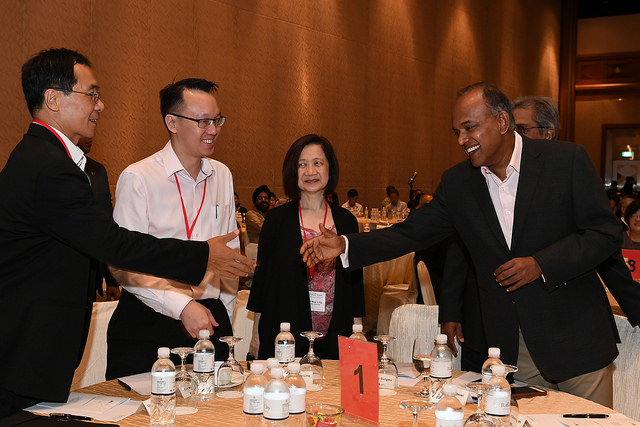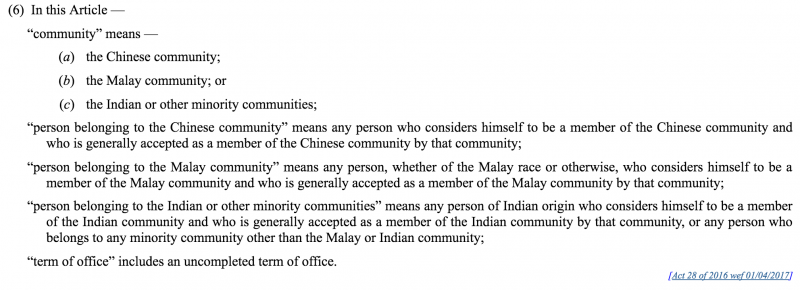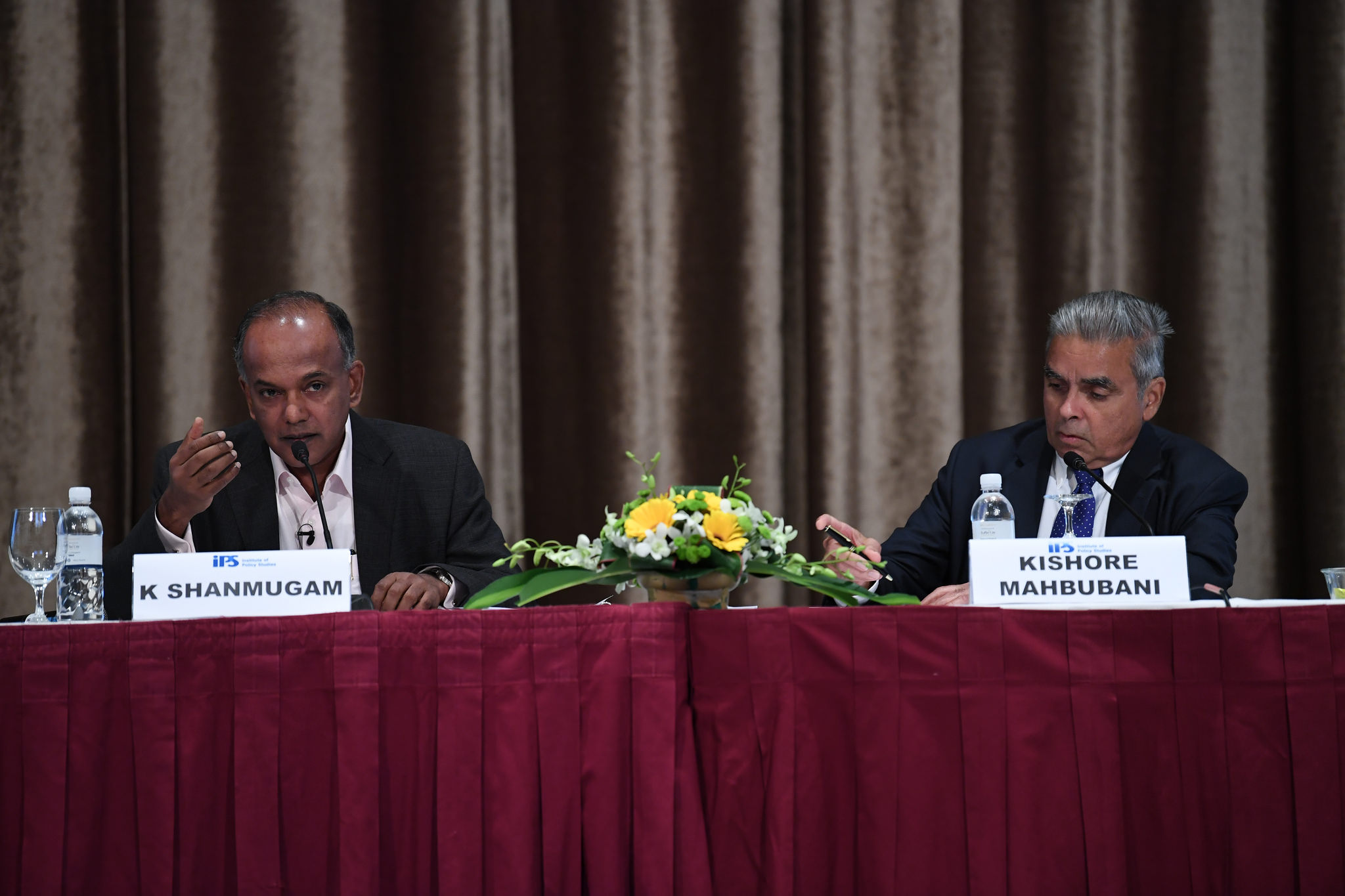With Nomination Day coming up on Sept. 13 for a Presidential Election reserved for Malay candidates, the question that has been floating around is what makes someone Malay?
Perhaps it's got to do with blood: If your parents are Malay, or one parent is, then you could call yourself a Malay person.
Or maybe it's about religion: Is being Muslim an important part of being Malay?
Or maybe it lies in your contributions and your activities in the Malay community: If you're a prominent and involved member of the community, then you could consider yourself Malay.
Kishore Mahbubani addresses the elephant in the room
People might be forgiven for thinking that a technical definition for "Malay-ness" was only introduced last year, when the government introduced amendments to the Presidency, making it reserved for Malay candidates.
But Minister for Law and Home Affairs K. Shanmugam knows otherwise.
Speaking at the Institute for Policy Studies (IPS) Forum on the Reserved Presidency on Sept. 8, Shanmugam was responding to a question from Kishore Mahbubani, the Dean of the LKY School of Public Policy and the moderator for the Ministerial dialogue:
"I think the obvious one that’s going to come up especially vis a vis the next election is who is a Malay? And what if the judgment of the Community Committee is deemed by some members of the public as being incorrect. Is there any recourse for legal or judicial challenge?"
Shanmugam replied with his typical candour:
"As this question has suddenly come up, again I think there has been a campaign of misinformation to try and confuse people. The criteria to who is a Malay was set out in 1988 in the Constitution."
 Photo courtesy of IPS LKYSPP's Flickr
Photo courtesy of IPS LKYSPP's Flickr
The question was already addressed for the GRC system in 1988
So the question was indeed raised, but already answered in 1988.
Firstly, you need to consider yourself part of the community. Secondly, you need to be accepted by a member of that community. And a Community Committee comprising prominent members of that community will decide if you were accepted or not.
Shanmugam also pointed out that the Community Committee was initially set up in 1988 to determine ethnicity for the purposes of fielding minority candidates in GRCs during general elections.
So the mechanism of defining someone's race was not something just introduced last year, but rather something the government has already been relying on for choosing who gets to be fielded in a GRC:
"The Committee that determines this for the Presidency is the same five people who have been doing this for the GRC. We’ve have been doing this for more than…since 1988. For about 30 years. We’ve been determining who is Indian, who is Malay. We didn’t have to determine who is Chinese, for the GRC system, but for the Presidency we will have to if that question comes up."
[related_story]
He then added:
"If you go back to the select committee, of the GRC in 1988, when we’re looking these amendments, what do they say? Sociologically, the only way to define an ethnic group is by self-definition. So this is not something new, we looked at it in 1988 and said ‘This is the way to define it. ’"
Therefore Article 19B of our Constitution reflects this position today.
[caption id="" align="aligncenter" width="441"] Gif from Amy's Life in gifs[/caption]
Gif from Amy's Life in gifs[/caption]
Whether of the Malay race or otherwise
Interestingly enough, Shanmugam gave a little more background on the original bill that would determine whether someone was Malay or not:
"The Select Committee also said, the legislation must not lay down prescriptive criteria, but should define a mechanism to let the community decide by itself. In fact the original bill in 1988 said any person being a Malay, Bugis, Javanese, Boyanese, Arab or any other person. But after the Select Committee hearings we dropped references to these Malay Javanese, Boyanese, Bugis, Arab because they said "Look, you mention some you don’t mention others, that’s wrong." So it’s now a bit broader than that. So that’s how you define, and the committee’s decision is final."
It seemed like "The committee's decision is final" was all Shanmugam would have to say in response to Kishore's second question. But if you look at the statute closely, the definition for Malay-ness is indeed slightly different than others.
 Screen shot from Singapore Statutes Online
Screen shot from Singapore Statutes Online
"Person belonging to the Malay community" means any person, whether of the Malay race or otherwise...
The reference to "otherwise" might seem puzzling, but following Shanmugam's revelation that the government wanted to include people of Javanese, Boyanese, Bugis and Arab origin as Malays, it becomes clearer. After all, those ethnic groups are technically not Malays.
And indeed, like Shanmugam noted, the current definition is even broader than that.
Mystery solved.
[caption id="" align="aligncenter" width="500"] Gif from Pinterest[/caption]
Gif from Pinterest[/caption]
By the way if you want to read the 1988 Select Committee's report on GRCs for yourself -- and you should, because knowledge is power -- you can find the pdf file here.
For greater inclusivity
During his own separate Ministerial dialogue, Minister Chan Chun Sing offered his own thoughts on this question of racial identity:
"Actually when we started this whole process, we wanted to balance meritocracy with multi-racialism. We want multi-racialism to be an inclusive concept. And in fact when we started this process and we went through the process, we had always wanted it to be inclusive definition. And if you recall in the recent weeks, race being hijacked by certain groups of people to make it an exclusive concept, you need to ask that particular group of people, why do they want to make it an exclusive concept, rather than an inclusive concept. Because what unites us is the inclusive concept, and not the exclusive concept."
Balancing the twin aims of meritocracy and multi-racial representation is a tricky task, but it's one worth getting right.
Related stories:
Law expert Kevin Tan says the S’pore Constitution’s definition of ‘Malay’ is anomalous
“No vote, no mandate? Not true” says Minister K Shanmugam on the Reserved Presidency
PAP prepared to pay political price for reserved Presidential Election: Chan Chun Sing
The unofficial race to Istana is descending into a competition of who is “more Malay”
Top image courtesy of IPS LKYSPP's Flickr.
If you like what you read, follow us on Facebook, Instagram, Twitter and Telegram to get the latest updates.



